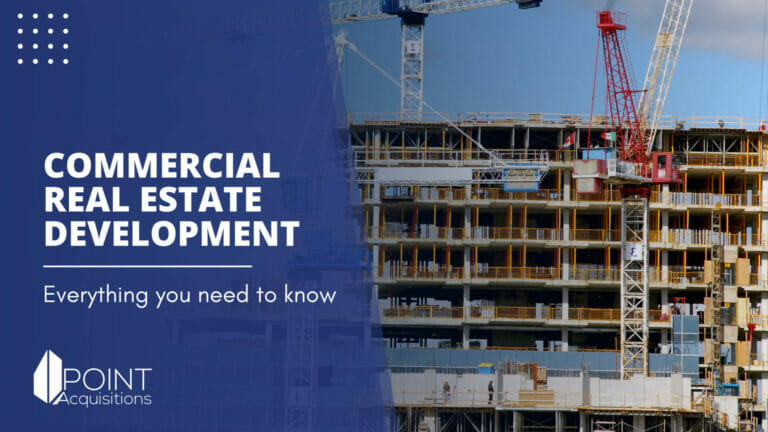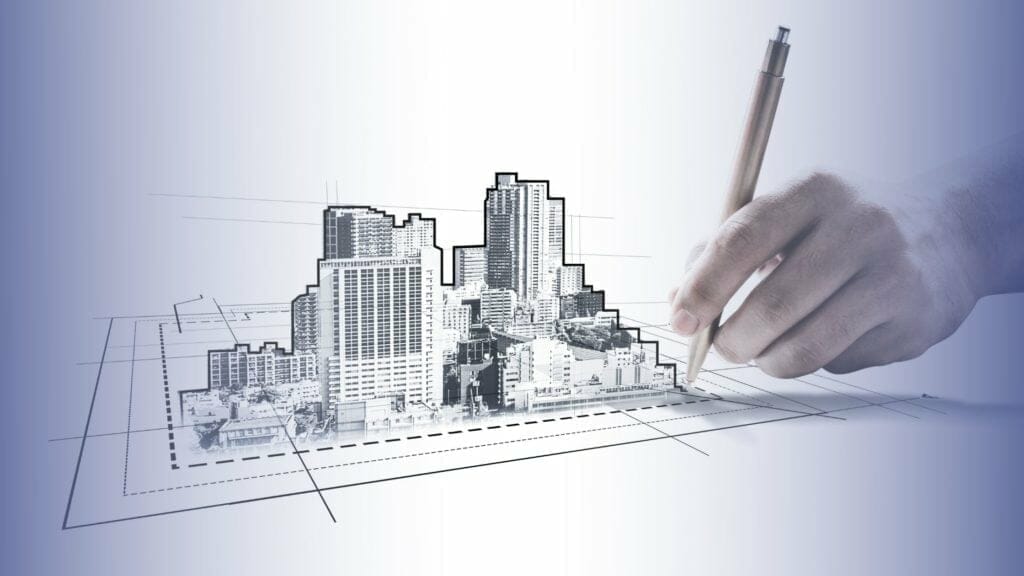
Everything About Commercial Real Estate Development
Commercial real estate development (CRE Development) is a process that can involve many different people and entities. It can be complex, but it is also very important for the growth of our economy. This blog post will discuss CRE development in depth. We will cover what it is, the process involved, the importance of commercial real estate development, the pros and cons, and how to get into this field yourself!
Table of Contents
What is Commercial Real Estate Development?
Real estate development is when a developer takes a piece of raw land or sometimes an existing structure and creates something new. The process can be complex, but it typically starts with identifying a site with potential for development. The developer then works with architects and engineers to design a new project that meets the market’s needs. Once the plans are complete, the developer secures financing and begins construction.

How Commercial Real Estate Development Works
The process of CRE development can be risky, but it can also be extremely rewarding. Development can create tangible assets that generate income and appreciate in value over time when done correctly. Given the potential rewards, it’s no wonder that CRE development is such a popular investment strategy.
This can include anything from an office building and retail centers to warehouses and manufacturing plants. The types of real estate can be leased or purchased, and they come in a variety of sizes and configurations, including:
Office space
Office space is a commercial building used by businesses for their day-to-day operations.
Retail space
Retail space is a commercial building used to sell goods and services to consumers.
Warehouse space
A warehouse is a commercial building that is used for the storage of goods.
Manufacturing space
A manufacturing space is a commercial building used for the production of goods.
Industrial space
An industrial space is a commercial building used to store or produce hazardous goods.
Multifamily housing
Multifamily housing is a commercial building that contains more than one dwelling unit, such as an apartment complex.
Single-Family
A single-family home is a commercial building that contains one dwelling unit.
Importance of Commercial Real Estate Development
CRE development is a key driver of economic growth. By creating new jobs, both during construction and after completion, commercial real estate development boosts employment and income levels. In addition, commercial real estate development can spur economic activity in the surrounding area by attracting new businesses and shoppers.
This increased economic activity can lead to further job creation and income gains, creating a virtuous growth cycle. Moreover, commercial real estate development generates tax revenue for local governments, which can be used to fund vital public services. For all these reasons, commercial real estate development is essential to the health of our economy.

The Process of Commercial Real Estate Development
The CRE development process can be broken down into key stages:
Stage One: Site Selection and Assessment
The first stage of commercial real estate development is finding a suitable site for the project. The developer must consider the location, zoning, size, and other factors to determine if the site is appropriate for the proposed development.
During site selection and evaluation, commercial real estate developers will check:
- Zoning regulations
- The size of the property
- Proximity to transportation and other infrastructure
- The local market conditions
After finding a suitable site, the commercial real estate developer will make the land purchase or reach an agreement with the owner to lease the property.
Research
When considering a commercial real estate transaction, developers must take care to examine all legal aspects of the property in question. Zoning restrictions, liens, and encroachments can all present significant risks that must be considered. A thorough examination of these factors will help to ensure that the transaction is advantageous and free from potential legal problems. By taking the time to understand the legal landscape, developers can avoid costly mistakes and ensure that their transactions are smooth and successful.
Contract Negotiation
The next stage of the process is contract negotiation. The developer will work with the site owner to negotiate a purchase price or lease agreement. The developer will also negotiate any other agreements necessary for the project, such as construction contracts during this process.
Design and Planning
During this stage of CRE development are design and planning. Architects and engineers will create plans for the proposed development. The relevant authorities must approve these plans before construction can begin. Once the plans are approved, the developer will begin to assemble the necessary permits and approvals.
Financing and Construction
The following step is securing financing and beginning construction. Commercial real estate developers will typically use a mix of debt and equity to finance their projects. Moreover, equity can come from personal savings, private investors, or public sources such as tax-exempt bonds.
After the commercial real estate developer secures financing, construction can begin. The CRE development process is now complete, and the developer can start leasing or selling space in the new development.
Search for a Zone And Entitlements
Zone and entitlements are two terms often used interchangeably, but they actually refer to two different things. Zoning refers to the regulations governing how the raw land can be used, while entitlements refer to the permits and approvals necessary to develop a piece of property. With that being said, to develop a piece of property, you need to make sure that it has the correct zoning for your intended use. You’ll need to rezone or re-entitle the site if it doesn’t.
Zone and entitlements are a critical part of any development project. The first step in any development project is to establish the correct zoning for the property. Zoning will define what sort of construction may be built on the location. If the incorrect zoning is in place, it may be impossible to develop the site. In some cases, it may be required to rezone or re-entitle the property in order to move forward with the project.
Using this method can be difficult and time-consuming, so working with a professional commercial real estate developer that has experience navigating the process is fundamental. Zone and entitlements are just one piece of the puzzle, but they are essential pieces that can make or break a development project.
About The Author

Jesse Shemesh
Disclaimer
Please note that Point Acquisitions is not a tax expert or tax advisor. The information on our blogs and pages is for general informational purposes only and should not be relied upon as legal, tax, or accounting advice. Any information provided does not constitute professional advice or create an attorney-client or any other professional relationship. We recommend that you consult with your tax advisor or seek professional advice before making any decisions based on the information provided on our blogs and pages. Point Acquisitions is not responsible for any actions taken based on the information provided on our blogs and pages.
1031 Exchange Capital Gains Tax Deferral
According to a 2021 report by the National Real Estate Exchange Services (RES), over 240,000 1031 exchange transactions were completed in the United States, totaling $100 billion. This impressive figure underscores the role of 1031 exchanges in the real estate…
Read More1031 Exchange Benefits
As of Q4 2023, the national vacancy rate for all commercial property types in the United States sat at 9.2%, according to CBRE’s latest insights and research. This represents a slight decrease compared to the previous quarter and suggests a…
Read MoreUnderstanding Commercial Property Value
The art of commercial real estate valuation is a critical skill in an industry teeming with over $1 trillion in yearly transactions. Our detailed guide on how to value commercial property is designed to elevate your expertise and give you…
Read More

